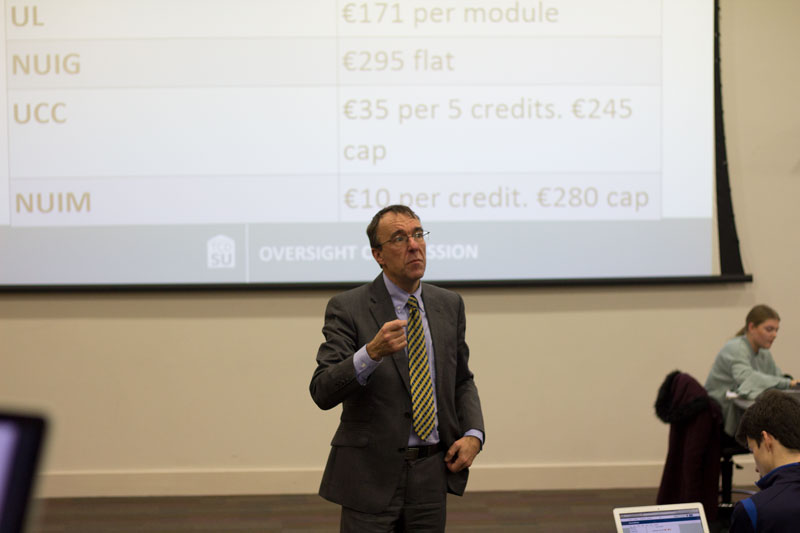Students could have faced €200 per exam repeated, with no cap, The University Times has learned, under a proposal that would have raised over €1 million for Trinity.
Documents sent to College Board before its February 28th meeting, seen by The University Times, show how Trinity weighed up the financial costs and benefits of three options regarding supplemental exam fees before eventually approving a model that would generate €777,600 from charging students a flat fee of €450 to repeat their exams.
Trinity College Dublin Students’ Union (TCDSU) President Kevin Keane has told The University Times that the €450 fee was first proposed ahead of the Board on February 28th. Vice-Provost Chris Morash, who piloted the fee proposal through Trinity’s bureaucratic structures, has repeatedly defended the fee, calling it fair and necessary in response to the mooted €1 million cost of introducing modular billing.
Board members were presented with three options in terms of the “potential income” they could bring in. The first option, whereby students – both postgraduate and undergraduate – would have paid €200 per module, with no overall cap on the amount paid, would have raised around €1.02 million for the College and was emphasised as being the only “cost neutral” option.
A second option, which would only have applied to undergraduate students, proposed the same €200 fee per exam, but with a cap of seven exams. Under this option, students repeating seven or more exams would have paid €1,400. However, this would have raised €784,800 – little more than the €777,600 brought in with the €450 flat fee that was approved.
The third option, which was ultimately approved by the College Board, was the least cost neutral of the three. Since the announcement of the supplemental exam fee, College has defended this decision as financially necessary.
In an email statement to The University Times, Vice-Provost Chris Morash said: “The key point here is that cost neutrality works both ways; both for the University, and collectively for students.”
“Recognising that Trinity was the only Irish university not to charge for supplementals, it was proposed that this could be used to make per-module billing for repeats cost neutral”, he said.
A breakdown of the number of students sitting supplemental exams and how many they sit was provided to Board members, as well as the amount of money the College would receive from these students.
Last year, 701 undergraduate students sat just one supplemental exam, while 411 students sat two. Around 100 students sat seven or more repeat exams. In total, 1,728 students sat supplemental exams.
In the same year, 257 postgraduate students sat one repeat exam, while around 400 in total sat supplemental exams.
Speaking at the Graduates Students’ Union (GSU) council last week, the union’s President Shane Collins pitched the exemption for postgraduate students as a victory. However, he and Keane both appealed to postgraduates to offer solidarity and support to undergraduates battling against College’s decision to introduce the fee.
Supplemental fees have been pushed as part of a package with modular billing, which would see students pay to repeat just the modules they have failed rather than paying to repeat the whole year. In the Board documents, modular billing was said to be “consistent with the University’s commitment to the introduction of more diverse forms of assessment, and is consistent with the principle of per-module billing for students who must repeat the year”.
Under powers granted to Trinity’s Finance Committee – the target of criticism following a fee hike for postgraduate students earlier this year – it will now be able to raise fees at its own discretion. Only Board, the College’s highest decision-making body, has the power to introduce new fees. The rate of the supplemental fee is frozen until 2022.
The decision has triggered anger across campus. TCDSU, which saw its preferendum on supplemental exam fees ignored by Trinity, has been pressured into action, organising pickets and protests over the last several days.
Keane, who disputed the minutes of a December Finance Committee meeting that The University Times revealed, recorded no dissent to a recommendation in favour of supplemental fees on principle and has promised all necessary action against College.







